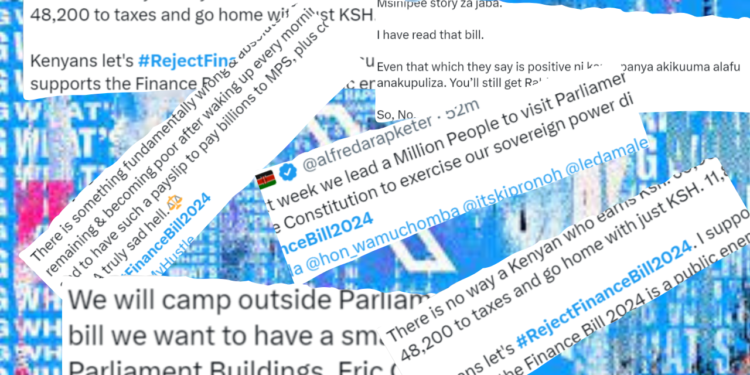Kenya’s Finance Bill 2024 has ignited widespread public opposition due to proposed tax increases on essential goods and services, triggering a robust debate on the nation’s fiscal policies.
Citizens and some opposition political figures alike argue that the bill will exacerbate financial strain on the common citizen, while the International Monetary Fund (IMF) supports it as a necessary measure to address the government’s revenue shortfall.
The bill has faced a surge of backlash, particularly on social media platforms. Kenyans are actively urging their Members of Parliament to vote against it, using hashtags like #RejectFinanceBill2024 and #RespectMyHustle to galvanize opposition. The movement has seen citizens share phone numbers of President William Ruto and numerous MPs, demanding they reject the bill.
Public sentiment against the bill has been overwhelmingly negative, with many seeing it as a threat to their economic well-being. This opposition is not only a reaction to the immediate financial impact but is also being viewed as a broader civic awakening. Citizens are increasingly engaging in public discourse and demanding accountability from their elected representatives.
“This bill will make life unbearable for the average Kenyan,” said one user. “We are already struggling with high costs of living, and these new taxes will only make things worse.”
The IMF, however, maintains that the proposed tax measures are crucial for stabilizing Kenya’s economy. In a statement, the IMF highlighted the importance of the bill in addressing the country’s revenue shortfall, ensuring fiscal sustainability, and maintaining investor confidence.
Despite the IMF’s endorsement, the public outcry suggests a significant disconnect between the government’s fiscal strategies and the populace’s expectations.
Some netizens have even vowed to camp outside Parliament on the day of voting.
The opposition is happening on the same day Nation Treasury Cabinet Secretary Prof. Njuguna Ndung’u is expected to present the budget. All eyes are on Parliament to see if the lawmakers will heed the public’s call or align with the IMF’s recommendations.
The outcome will not only shape Kenya’s economic future but also set a precedent for how citizen-led movements can influence legislative processes.
















